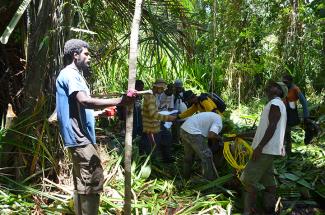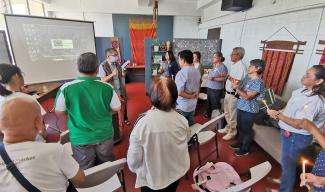Supporting Community Initiatives in Forest and Land Management
Posting Date
The Samdhana Institute's Papua Program aims to bring forward examples of natural resources management in Papua that are legal, sustainable, and contribute to improving the livelihoods of local communities. The program works towards legal recognition of, and protection for, continued community management of community forests and lands. In 2013, the Papua Program provided support to PERDU to implement AFP3. AFP3 facilitated the process of documenting resources and developing community plans for two communities in Baliem Valley that had previously completed a participatory mapping process of the two areas. A similar process was also undertaken in Esania Kaimana, West Papua, where the community continues to prepare maps and and resource management plans in preparation for designation as village forests.
AFP3 is rooted in strengthening existing resource management infrastructure, while supporting de jure recognition of de facto community forest and land rights. This includes processes that rely on local elders, communities, and facilitators to create inventories of social, economic, and ecological resources. This process looks to enable community organisations such as Madewana Cooperative of Kaimana to become sustainable and directly manage activities in the longer term. To maximise coherence and opportunities for collaboration, AFP3 also emphasised linkages between stakeholders at the national, provincial, and districts levels as an important part of this project.
Samdhana and partners have learned valuable lessons and continue to face interesting questions brought about by the dynamic environment, early successes, as well as on-going challenges.
Not least, communities consistently ask why legal licenses are needed to manage forests and land that have been their customary forests for centuries? In particular, those who are most active in local forestry question the motives and motivation of the local government in facilitating legalisation of existing community forest and land management. Thus far, unsurprisingly, Samdhana and partners have found that the manner in which technical and legal aspects of forest management are conveyed particularly how legal terminology is conceptualised and explained—strongly influences community perception and willingness to take part in legalisation. Yet this also raises glaring concerns on both the efficacy and sustainability of these efforts. Are communities sufficiently convinced by the efficacy of following processes to register and legalise resource rights that, while obvious to the communities themselves, are currently not recognised by the government? Is the current period of facilitation through AFP3 sufficient for the community to continue to sustain the work of legalisation of their de facto rights? Underpinning all of this is whether the national government will provide adequate support in the form of responsive and appropriate administrative procedures to make good on their promises to support communities in Papua to manage their resources legally and sustainably.
Recent history has not proven a particularly optimistic guide. In the provinces of Papua and West Papua, the system of eco-forestry licenses remains badly implemented due to conflicting regulations between the Forestry Law (Act 41/1999) and Papua's Special Autonomy Law (Act 21/2001). One significant area of conflict between these two regulations is in legalization of timber trade. Communities face challenges in transporting timber to the market even with management licenses provided by the Papua Governor. Across Indonesia, the timber trade is regulated by Act 41/1999, but the licenses under which communities are granted legal rights to manage their customary forests falls under Act 21 of 2001. In November 2013, the forestry partners in Papua sent an objection letter to the Ministry of Forestry to encourage quick action towards resolution of conflicting regulations.
Ultimately, collaborative efforts must continue to ensure legal, sustainable, and profitable community initiatives in forest and land use in Papua.
AFP3 is rooted in strengthening existing resource management infrastructure, while supporting de jure recognition of de facto community forest and land rights. This includes processes that rely on local elders, communities, and facilitators to create inventories of social, economic, and ecological resources. This process looks to enable community organisations such as Madewana Cooperative of Kaimana to become sustainable and directly manage activities in the longer term. To maximise coherence and opportunities for collaboration, AFP3 also emphasised linkages between stakeholders at the national, provincial, and districts levels as an important part of this project.
Samdhana and partners have learned valuable lessons and continue to face interesting questions brought about by the dynamic environment, early successes, as well as on-going challenges.
Not least, communities consistently ask why legal licenses are needed to manage forests and land that have been their customary forests for centuries? In particular, those who are most active in local forestry question the motives and motivation of the local government in facilitating legalisation of existing community forest and land management. Thus far, unsurprisingly, Samdhana and partners have found that the manner in which technical and legal aspects of forest management are conveyed particularly how legal terminology is conceptualised and explained—strongly influences community perception and willingness to take part in legalisation. Yet this also raises glaring concerns on both the efficacy and sustainability of these efforts. Are communities sufficiently convinced by the efficacy of following processes to register and legalise resource rights that, while obvious to the communities themselves, are currently not recognised by the government? Is the current period of facilitation through AFP3 sufficient for the community to continue to sustain the work of legalisation of their de facto rights? Underpinning all of this is whether the national government will provide adequate support in the form of responsive and appropriate administrative procedures to make good on their promises to support communities in Papua to manage their resources legally and sustainably.
Recent history has not proven a particularly optimistic guide. In the provinces of Papua and West Papua, the system of eco-forestry licenses remains badly implemented due to conflicting regulations between the Forestry Law (Act 41/1999) and Papua's Special Autonomy Law (Act 21/2001). One significant area of conflict between these two regulations is in legalization of timber trade. Communities face challenges in transporting timber to the market even with management licenses provided by the Papua Governor. Across Indonesia, the timber trade is regulated by Act 41/1999, but the licenses under which communities are granted legal rights to manage their customary forests falls under Act 21 of 2001. In November 2013, the forestry partners in Papua sent an objection letter to the Ministry of Forestry to encourage quick action towards resolution of conflicting regulations.
Ultimately, collaborative efforts must continue to ensure legal, sustainable, and profitable community initiatives in forest and land use in Papua.




